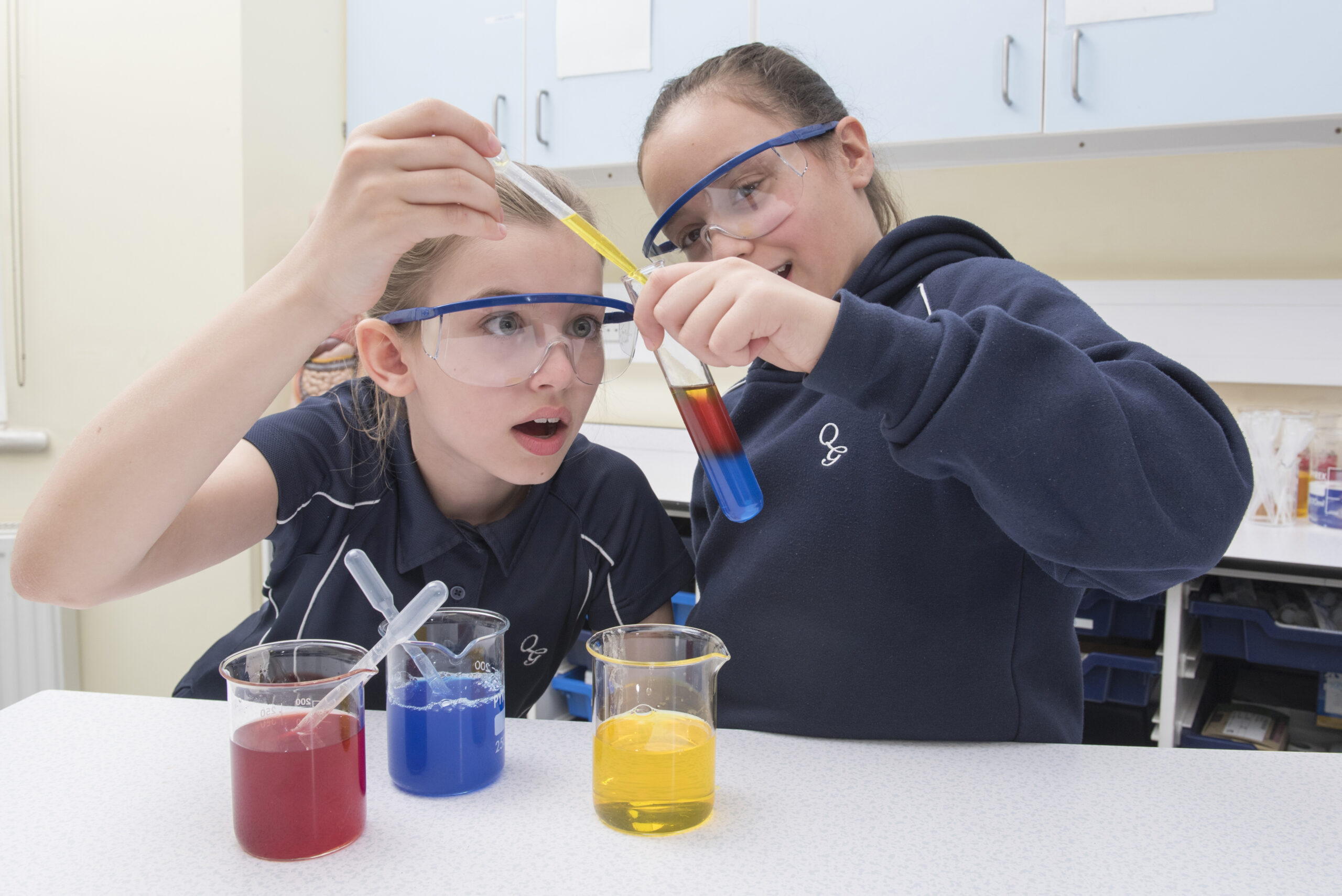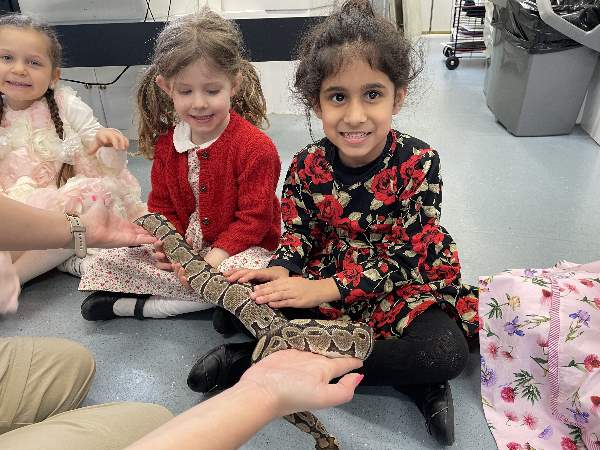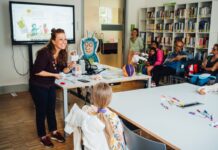
What parents need to know about the importance of a specialist science curriculum from a young age – and how they can help to inspire a love of science at home.
What are the advantages of a specialist science curriculum from a young age?
‘You can never be too young to light a Bunsen burner,’ says Carol Mayne, Head of Chemistry at Queen’s Gate School and Science Co-ordinator in the Junior School. ‘Science is all about experimenting. Science is not about right or wrong. Science is finding out. Science is hands-on, so children need all those opportunities as early as possible.’ Carol enjoys shaping the Junior School curriculum and loves hatching chicks with five-year-olds as much as she loves preparing eighteen-year-old chemists for medical degrees.
Queen’s Gate Junior School’s young scientists are enormously fortunate. In the five South Kensington buildings which make up the school, there are six laboratories, shared between Junior and Senior School pupils. Girls as young as six use the labs and the emphasis is on practical experiments. ‘It’s a fun subject because the pupils are in white coats, they have safety glasses and they’re doing stuff—it’s the doing bit that’s so important,’ says Carol. ‘We order blunt instruments, bendy needles, tweezers with flat ends so it’s all there for the young children.’
And the school sees the results of early engagement in science through the enthusiasm for physics, biology and chemistry when pupils choose their examination options. ‘Girls doing GCSE or A Level science can still remember little things they did in the Junior School and I am sure that they have this passion simply because they did science so young.’
Carol reflects on her former pupils who have become scientists – she has recently been in touch with one girl who is currently a third-year medical student at King’s College. ‘She was a lovely pupil in the Junior School; she was so interested and she had the right environment at Queen’s Gate both to study science and to let her confidence grow. It’s just amazing what she gets up to at University and I am very proud of how well she is doing—she is blossoming.’
In fact, Old Girls regularly visit the school to share their experiences with current pupils. Carol says, ‘We invite them back and ask, “What sparked your interest in a STEM subject?” They talk to current pupils and inspire them.’
The Director of the Junior School, James Denchfield, has also recently been in touch with a former pupil who now works at the European Space Agency and hopes to bring her back for an ‘Albertopolis’ lecture for younger pupils who are studying space. Other recent speakers for this programme have included palaeontologists from the neighbouring Natural History Museum. ‘Curiosity is what matters,’ he says. ‘Exam results are all well and good, but our girls are genuinely curious about the world around them. We always encourage them to ask that most important of questions—why? If we can get them asking this at school, and parents give them chance to do the same at home, we have pupils who are inquisitive, critical thinkers—and this is important in all disciplines.’
Having such wonderful museums on the doorstep in South Kensington is also a great advantage, says James Denchfield. ‘Our girls are very lucky—Science Club visits the museums every week. Other teachers, as well, are able to walk over with their classes whenever an opportunity presents itself within the curriculum, be it examining dinosaur bones or understanding robotics.’

Science in the Community
Just before half-term, Queen’s Gate held its annual Science Week: pupils across the school were treated to science shows, complete with huge explosions, close encounters with snakes, an environment dome, and virtual reality workshops. Senior pupils had lectures from prominent scientists, including Dr Emily Grossman who not only shared her passion for science but also inspired girls by highlighting the accessibility of scientific careers for women and emphasising the creative side of science.
One of the highlights for Carol, however, was a science competition in which pupils from local schools came to the Junior School to experience the visiting planetarium, take part in a science quiz and undergo a STEM challenge, building structures with spaghetti and marshmallows.
‘The visiting pupils were so excited to be in our laboratories, because they did not have them at their own schools. It was also lovely for our girls to interact with other children, including boys. It reminded me about how differently girls and boys learn. If we were a co-ed school, I feel the girls wouldn’t be quite as interested in STEM subjects as they are—I can say this after teaching boys and girls and mixed. Girls are much more confident in single-sex science settings; however, it’s really useful for our pupils to meet with boys and mix with them at this stage.’
How can parents inspire a love of scientific enquiry?
‘Everything is an experiment, that’s what is important to remember,’ Carol reflects. ‘Bath-time is an experiment. Meal-time is an experiment. Allow children to ask questions and give them prompts. Read recipes together and measure out the ingredients—and don’t worry about making a mess!
‘Also, think about the value of toys. Expensive toys—you tend to use them once to do one job. Toilet rolls are great toys. Ask children how they could use items to do more than one thing – “Look, it’s not a toilet roll, it’s a rocket!” I remember making a Thunderbirds rocket with my son on holiday one year—just with Evian bottles. The project kept him busy for the entire week.’
Carol’s Family Science Challenge – Experiments with Cabbage
- Ask your child to put vinegar or lemon juice on cooked red cabbage and look at what happens. Ask them why it changes colour.
- Mix red cabbage with other safe household chemicals: kitchen spray, shampoo, toothpaste—even spit!
- Try experimenting with other vegetables like beetroot and red onions
 Queen’s Gate is an independent girls’ school in South Kensington for 4-18-year-olds.126 Queen’s Gate, South Kensington, London SW7 5LE 020 7589 3587 https://www.queensgate.org.uk/
Queen’s Gate is an independent girls’ school in South Kensington for 4-18-year-olds.126 Queen’s Gate, South Kensington, London SW7 5LE 020 7589 3587 https://www.queensgate.org.uk/




